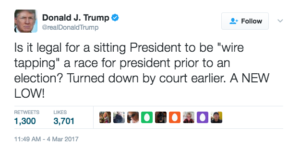 Frans van Eemeren and Rob Grootendorst have a section titled 10 Commandments of Reasonable Discussion to close their masterwork, A Systematic Theory of Argumentation.  The second and ninth are of import.
Frans van Eemeren and Rob Grootendorst have a section titled 10 Commandments of Reasonable Discussion to close their masterwork, A Systematic Theory of Argumentation.  The second and ninth are of import.
2. Discussants who advance a standpoint may not refuse to defend his standpoint when requested to do so. (p. 191)
9. Inconclusive defenses of standpoints may not lead to maintaining those standpoints…. (p.195)
It’s a truism that if you assert that p and you’re asked to give reasons, you should. Moreover, it seems clear that if you don’t have any reasons to hold p true, then you should (if you asserted it) retract your assertion. That’s responsible cognitive management, responsible assertion. No evading the burden of proof if you assert, and if you can’t fulfill the requirements of the burden, stop asserting.
How epistemically demanding this norm must be is a matter of some debate. Here are a few of the contenders:
C-Norm: S may assert that p only if S is certain that p.
K-Norm: S may assert that p only if S knows that p.
RBK-Norm: S may assert that p only if S reasonably (but possibly fallibly) believes that S knows that p.
J-Norm: S may assert that p only if S has epistemically justifying reasons for believing that p.
W-Norm: S may assert that p only if S has warrant for holding that p (but S does not have to believe it)
T-Norm: S may assert that p only if p is true.
The literature on norms of assertion are all over the place on which of these norms obtains, but with the exception of the T-norm, it’s not hard to see how these norms explain why Rules 2 and 9 above obtain. (Those who hold the T-norm maintain that the obligation to defend is pragmatically derivable from the T-norm.) In short, the point is to see that those who assert, by way of asserting, shoulder a burden to argue as a consequence.
 Donald Trump’s tweet, assuming it’s an assertion, requires some backing. And given the seriousness of the accusation, the urgency of his shouldering the burden of proof is pretty significant.
Donald Trump’s tweet, assuming it’s an assertion, requires some backing. And given the seriousness of the accusation, the urgency of his shouldering the burden of proof is pretty significant.
John McCain’s appearance on CNN’s State of the Union was an instance of someone invoking the rule. His challenge is:
The President has one of two choices: either retract or to provide the information that the American people deserve . . . . I have no reason to believe that the charge is true, but I also believe that the President of the United States could clear this up in a minute. All he has to do is pick up the phone, call the director of the CIA, director of national intelligence and say, ‘OK, what happened?’
The problem is that the current President is used to asserting confidently to a roomful of his yes-men or to a group of supporters and never getting pushback. He can say: believe me, I’ve got information… and they do. But now that he’s President, his assertions have wider audience and plenty of folks want the backing.
So many reasonable options for asserting things, and yet, none seem desirable. Here’s a quote from a couple of days ago that may explain this approach:
““The president just has a great nose for these things,†the official said. “It’s the bureaucratic leaks — the deep state — that bother him most. Even if it turns out not to be true that they surveilled Trump Tower, he will have a very good point to make about the level of sabotage coming from Obama holdovers.â€
He may be asserting that p with no evidence, but this doesn’t mean that q isn’t true. Riddle me that, professor!!!!!
Hey John, Nice!
Your earlier post is about the ‘seriously, but not literally’ line of thought that was running for a while. Just as when T says, “X percent of the populace is out of work,” he means “lots of people were out of work,” when T says “Obama spied on me,” he really meant, “Obama doesn’t have a birth certificate.”